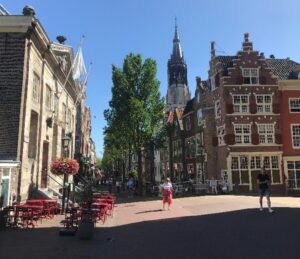Kategorie: ‘Netherlands’
Writing a master’s thesis at TU Delft
- Molecular and Applied Biotechnology M.Sc.
- Netherlands, Delft
- TU Delft
- 05/2023 – 10/2023

A street in the city centre of Delft (weekday), with the Nieuwe Kerk in the background.
© Raoul Liepelt
I wanted to do my master’s thesis abroad and therefore applied at a few universities across Europe. Applying at TU Delft, I noticed that there was no need to be shy, as they were very friendly, helpful and quick at replying to my e-mails. You can simply write to the research group leaders directly, introducing yourself, and stating that you are interested in doing a thesis with them and why (with attached CV and grades of course). At the section I applied to, the section of Bioprocess Engineering, they even have a standardized procedure. I ended up working on Microbial Electrosynthesis, which is a topic that I did not know that much about before coming to Delft.
I was lucky enough to receive university housing with Duwo. They are by far the cheapest and easiest option if you can get a flat with them. If you do receive housing by them and your flat is dirty upon entry, make sure to immediately complain directly to them. This was my mistake, as I complained to the university and therefore did not achieve anything and had to spend several days cleaning my flat by myself, which was extremely dirty.
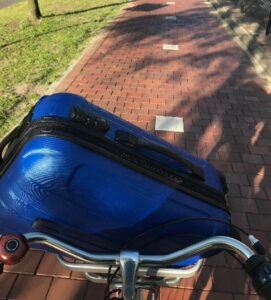
Doing everything by bike and public transport: The Netherlands make it possible
© Raoul Liepelt
From what I have heard from other students, this is not common, but can sometimes happen. However, the rental market in the Netherlands and especially Delft is very bad, so this is still your most financially affordable option. Otherwise, I can recommend trying for flat shares on kamernet etc. Do note that knowing a bit of Dutch might be a heavy asset.
In my section at TU Delft, I thoroughly enjoyed the working culture, which was a bit different compared to what I was used to.
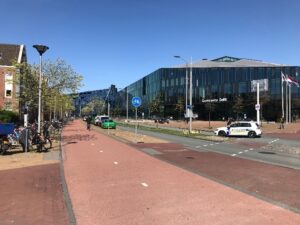
The modern train station with one of the largest roads for cars of Delft and a bicycle path in front of it
© Raoul Liepelt
Hierarchies were much flatter and more collegial, and everybody at the section had their breaks together, even most of the professors. A lot of my colleagues were internationals and from different backgrounds, and I could always find someone to talk to about problems I was facing in my research or in general. Whether it was in post-lab
barbecuing sessions, having international treats, or watching Barbenheimer, I greatly enjoyed my time there and I miss all of the wonderful people I got to know in the section already.
Delft, like a lot of Dutch cities, is a greatly designed and beautiful little city that makes getting around by bicycle not just trivial, but natural. It is indescribable unless you experience it for yourself. Because of the lack of cars, the city is really quiet and cozy, even in the bustling centre. For me, getting around or exploring the area by bicycle never got old, even though I never cycle here in Germany.
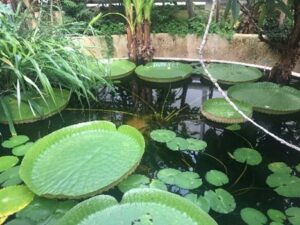
Exotic plants at the botanical garden of TU Delft.
© Raoul Liepelt
Delft is also extremely well connected by efficient public transport to other major Dutch cities, such as The Hague (with the beach at Scheveningen), Rotterdam, Leiden, Haarlem, or Amsterdam, so I can heavily recommend making trips to these places if you are there. For this, I would advise you to get a personal OV-chipkaart as one of the first things that you do when you arrive. It makes taking public transport much easier and cheaper if you take out a subscription,
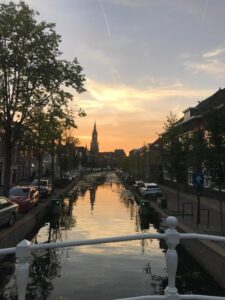
Good-bye Delft! Sunset over the Nieuwe Kerk.
© Raoul Liepelt
which I can also recommend.
To my surprise, it is possible to rent canoes and go on a ride in the canals of Delft, which was amazing to do. Delft also hosts a large amount of small shops, cafés and restaurants that were really lovely to explore, and I always asked the locals which ones were best for my needs, and they were happy to provide me with plenty of tips. If you are there in early-mid spring, you can check out the tulip gardens at Keukenhof, which are really lovely and colourful, even if they are a bit full at times. Lastly, the TU Delft botanical garden is definitely worth checking out, and it is free if you are at TU Delft.
All in all, I can heavily recommend the Netherlands and Delft in particular. If you happen to be interested in Bioprocess Engineering, give the section I was in a try! My Erasmus money went entirely to my rent and was therefore essential in financing my stay in Delft. I am really thankful that I was granted this opportunity!
Wonderful experience in Eindhoven
- Electrical engineering, information technology and computer engineering M.Sc.
- The Netherlands, Eindhoven
- Stichting imec Nederland
- 02/2023 – 08/2023
The internship
I really enjoyed the internship at the company imec. Imec is a belgian company and founded the Holst research center in Eindhoven in 2005. Imec is an industry related research center in the field micro and nano-electronics and deals with technical projects in the areas of health & vitality, energy &climate, mobility & industry 5.0. The application was quite straightforward, and I already had feedback and the (digital) interview within a few days. Starting the internship, I noticed right away that the team is quite young and insanely nice and friendly. Everyone is super helpful, open and you feel right at home. There were always recreational after-work activities with the team that you could participate in if you wanted to. Since the team was also very international, it was no problem that I didn’t speak the language, because everyone spoke English anyway. The Holst center is located on the so-called High Tech Campus. On the High Tech campus, many different technical companies are located and there is an area with a supermarket, a few restaurants where you can eat something at lunchtime and a gym. Due to the many green spaces and a small lake, the High Tech campus is also suitable for a walk and therefore quite a nice location for an office.
My internship was part of the health department where an implantable stimulation electrode was developed. For me, that was the perfect project as it combined the electrical engineering and medical aspect in such an interesting way. I learned a lot and I felt very valued because my opinion and ideas were very well appreciated by the rest of the team. Beside the daily work I also had a weekly progress meeting with my supervisor and imec, where we discussed my latest work and the upcoming steps. I felt very well taken care of, as thoughts and ideas could be freely expressed and my questions were always answered.
Accomodation and living expenses
One of the more difficult aspects was to find a room to stay, since there are generally too few housing options for students in Eindhoven. I used the site kamernet.nl and was lucky to find a room. The site has a monthly fee in order to be able to contact the landlords, but I would advise everyone to invest this money. I wouldn’t recommend using Facebook groups, because there are many scammers. The rents are relatively expensive, and one must expect about 500 – 600 € for a room in a shared flat. In general, the Netherlands is a bit more expensive than Germany, both for food but also for going out.
Eindhoven and surrounding
Eindhoven is a modern city. The city center is quite large and there are many stores, restaurants and bars. In particular, there are also somewhat exotic restaurants such as Indonesian or Ethiopian. Due to the existing university, there are also many young people around. Especially in summer, the various parks are very well attended and are very nice to enjoy the weather and nature. It is advisable to get a bicycle for the time here, as this is the best way to get around. There are very good and safe bike paths and almost everything is optimized for cyclists. I took mine from Aachen, but otherwise there is also the possibility to rent a bike at Swapfiets. To travel to other cities on weekends, the trains are particularly suitable. I can only recommend at this point to visit the cities of Utrecht and The Hague, because they are both beautiful. The app “9292” shows all bus and train connections within the Netherlands and is therefore very useful.
Conclusion
All in all, it was a wonderful experience. I was able to learn a lot during the internship and also the working atmosphere was very friendly and welcoming. The company imec has a lot of different and very exciting projects and therefore I would recommend everyone to have a look around here if you are looking for an interesting internship.
Internship in Eindhoven
- Electrical Engineering M.Sc.
- Netherlands, Eindhoven
- ASML
- 04/2023 – 08/2023
Application:
As I was looking for a place for my mandatory internship, I was first and foremost looking for a good company to stay at. The actual country to which this internship would take me was secondary to this for me, although the idea of living outside of Germany for a while did excite me. Due to the Erasmus Internship program I could freely explore internship vacancies within the European union without much worries, which opened many possibilities for interesting companies. The application process in my experience is similar to many German companies, although the interviews and documents were of course in English.
Accommodation & Living expenses:
Finding accommodation in the area around Eindhoven is hard. The housing market in that region is quite exhausted due to a high number of students who are attending the local university, and the local high-tech campus with large companies like Philips and ASML who have employees with much larger budgets looking for flats as well. The prices for rooms in shared flats are high, and even then, getting a place in one is difficult. Furthermore, some local (private) student housing providers only accept students of the local university. Due to the short duration of my stay, I did not have much success in getting accommodation through the local web portals like kamernet which are popular to find roommates either. In the end I luckily found a stay through an initial Airbnb booking, but this method is far from reliable. The expenses for groceries are higher than in Germany, but still affordable. The main problem is for sure finding accommodation.
Everyday life / The internship:
One of the most important tips for everyday life is surely to get a bicycle. The entire region is very accommodating for cyclists, and with the little height differences in the Netherlands cycling is a very comfortable way to get around. My company had an entire bicycle parking garage, as well as bicycle paths. Downtown areas too provide easily accessible parking spaces for bikes, which often makes them the most reliable method of getting around. It is often times even faster than taking the car. There are offers which rent out bicycles for quite a good price on a monthly basis, with full insurance as well, which I would recommend looking into so that you don’t need to bring your own bicycle with you.
During the internship the people I have encountered were all quite cheerful and not very keen on hierarchy. It is common to talk on a first name basis with every superior, and all members of our team were sitting in one open office with an open-door policy (well we didn’t have doors after all). There is a large focus on mental health, preventing burnouts, and team building, which was very nice to experience. As an intern I profited of this fundamental attitude a lot, since I was free to go around and ask anyone for help if needed and got to know the people much quicker than I would have with individual offices or a more secluded workspace. I felt part of the team quickly, and towards the end when some of my coworkers referred to me when tackled with problems I had dealt with during my own project I felt like the team had properly included me although I was bound to leave again.
Free time / tips:
As mentioned above, I would heavily recommend bringing or get a bicycle to get around. Other than that, I can recommend asking coworkers for help if you are looking for anything or need help with something, even outside of work. From my experience they are happy to help you settle in and get adjusted quickly.
In my opinion the city of Eindhoven is not that much of a tourist attraction, so look around a bit further to see where you want to go in your free time. There sure is a lot to see, just maybe not right in front of your doorstep.
Conclusion:
All in all, I can recommend an internship in the Netherlands very much provided you can find an accommodation, where availability heavily depends on the city. The country is especially appealing to students with its focus on bicycles, which are a lot cheaper to maintain than a car. The cost of living, although more expensive than Germany, is manageable. The people are very welcoming, and it’s quite fun that many are excited to test their German skills when they learn where you’re from. The culture and language are close enough to German so you can get around, while still providing the experience of a foreign country. In case something goes majorly wrong you can return to Aachen within a few hours so that the first longer term foreign stay is not all too scary. In conclusion, for anyone who wants to dip their toes into going abroad, going to the Netherlands is a great start.
My stay in the modern town of Delft
- Robotic Systems Engineering, M.Sc.
- Netherlands, Delft
- Delft University of Technology
- 08/2022 – 02/2023
I am a master student from RWTH Aachen, Germany. My first impression of Delft was that it is a very clean and modern town, which is reflected in the clean and tidy train station. The greeting drivers on the bus, the friendly waiters in the restaurants and the passers-by who welcomed me to Delft all proved the warmth of the people there.
Culture shock
The biggest culture shock was the heavy use of bicycles. In Aachen, bicycles are not the most dominant mode of transportation, probably because the city is not very big and some of the roads are not smooth. But Delft has a surprisingly large number of bicycles, and it certainly is the most dominant form of transportation in Delft. There are two-way bike lanes on both sides of Delft’s roads, which provides a huge convenience for cycling. Therefore, if you are coming to the Netherlands for an internship, my most recommended mode of transportation is by bike. Another culture shock is the book bags hanging in front of many houses. I didn’t know much about this phenomenon at first, but after asking friends and checking the internet I realized that hanging school bags is how Dutch students celebrate graduation. Another interesting phenomenon is the way people relax
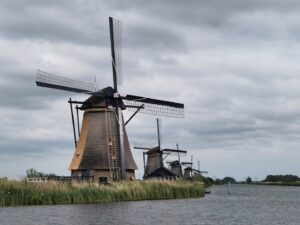
© Disen Wang
on weekends, which is boating. This is a phenomenon that can only be seen in parks in China and Germany. Probably because there are many rivers in Delft, I found that many families have their own boats and have the habit of boating, which I think is a very interesting way to have fun. The most comfortable thing for me is the widely use of English and the cashless shopping, which is not available in Germany. The English language is so widespread in the Netherlands that you can live in the country without any problems even if you don’t speak Dutch. I don’t need to carry a lot of cash every day because of the wide use of cards payment. One thing I don’t quite understand is that when it comes to cash transactions, the smallest unit is 5 cent, and they won’t give back any change less than 5 cent. I hope you won’t stand at the counter like me and wait for them to find the money.
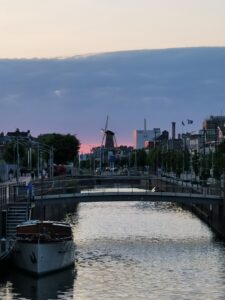
© Disen Wang
Health insurance
As an international student with German insurance, it is not difficult to visit a doctor in the Netherlands and you do not need to apply for new insurance. You can use your German insurance to visit a doctor in the Netherlands, but the process is a bit different than in Germany. The German insurance card cannot be used directly in the Netherlands, so you need to pay for your own medical expenses first and then fill in the reimbursement information on the German insurance company’s website. I went to the dentist in Delft, and I was able to get reimbursed by my German insurance company for both the doctor’s visit and the medication. However, not all medications are reimbursed, and some may not be covered by insurance. My total cost was 97.11 Euros and was finally reimbursed 92.11 Euros, and the result of the review was issued within a week, which was acceptable to me. Of course, I still hope you won‘t get sick!
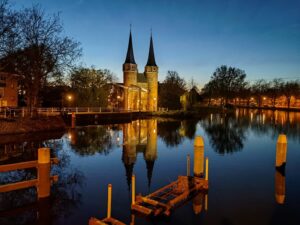
© Disen Wang
Travelling
First of all I would like to start with a few words about train rides. Unlike Germany, you need to go through ticket machines to enter and exit the stations in the Netherlands. In addition, the ticket prices in the Netherlands are fixed and do not change with the date of purchase like in Germany, which is very friendly for people who do not like to plan their trips in advance. I also highly recommend getting an OV chip card, which can be used for most trains and buses in the Netherlands, so you only need to swipe it when you get in and out of the station, no need to buy tickets online. Rotterdam is a very modern and clean city with a lot of skyscrapers, which is not like a typical European city. The Kinderdijk, located near Rotterdam, is one of the most impressive tourist attractions for me. The beach in Den Haag is very beautiful and I like it best in the evening, when the crimson sunset shines on the beautiful clouds and the beach, and you can see some boats and windmills in the distance. Amsterdam is also a city I really like, it is more historitic compared with Den Haag and Rotterman. The Royal Palace of Amsterdam is gorgeous. The Van Gogh Museum and the Dutch National Museum are also well worth a visit. Another point worth mentioning is
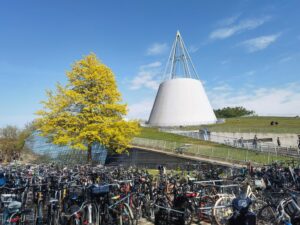
© Disen Wang
that most of the attractions in the Netherlands have audio guides in several languages, including but not limited to English, Chinese, Dutch, French and German, which is really friendly to foreign visitors. The following pictures were taken by myself. The first three are in Delft and the last one is in Kinderdijk.
All in all, I really enjoyed my visit to the Netherlands. If you also like to explore different cultures, please don’t hesitate to come to the Netherlands, you will never regret it.
Great internship in an architecture office
- Architecture M.Sc.
- Netherlands, Rotterdam
- studio AAAN
- 11/2022 – 04/2023
Application/Finding an internship
I did my internship with Erasmus+ in the Netherlands in Rotterdam. There I spent 5 months working in an architecture office.
Finding a spot for an internship was definitely time-consuming and at times a bit frustrating. Many offices didn’t respond to my application at all. For me it helped to not only focus on the well-known offices, but to look for smaller ones as well. When one of these offices invited me to do an interview online, I was delighted. It went quite well and they offered me the position right away.
Accomodation & Living expenses
From that point on everything happened very quickly and there was still lots to do.
For example, finding a place to stay. In Rotterdam that turned out to be quite the task. Many people are looking for accommodation in the city, so finding something can be a challenge. I found my place via kamernet.nl, where I got a subscription and messaged as many people as I could every day. You definitely need to be quick, but it’s possible. In the end I scored a room in a shared student house in Rotterdam West. I was really lucky to have great flatmates and I absolutely loved living in West. It’s a really nice area close to the centre where a lot is happening, so I can only recommend checking it out.
Living in Rotterdam can be rather expensive. Rent was quite a bit more than in Aachen, where I study. Also groceries, restaurants, museums and other activities can really add up. While that’s something to be aware of, with my internship salary, the Erasmus+ scholarship and subletting my room in Aachen, it all worked out.
Everyday life/ the internship
The internship was great. It was a small and young team and everyone was super friendly. I felt very welcome from the beginning and genuinely enjoyed going to the office. In my experience Dutch people are very open and their English is fantastic, so it was easy to connect with them. They also seem rather laid-back but are still upfront and share their honest opinion. I really enjoyed that mentality. My bosses taught me a lot about architecture in general and in the Netherlands and my colleagues soon became good friends. After work we would often grab something for dinner or go to the local wine bar. Once a week some of us also went bouldering together.
Free time/tips
On the weekends I would meet friends and explore Rotterdam and the surrounding area. My favourite part about the city are the endless possibilities of activities. There are many great museums and art galleries for example. I would highly recommend getting the Museum card or the Rotterdam pass if you’re interested in that. I didn’t get it and I think I could have saved a lot of money.
I also fell in love with the many markets. Pop-up graphic design markets, vintage kilo sales, the food and clothes market in front of Markthall, the market at Noorplein – there is lots to discover. It’s definitely helpful to follow some websites or Instagram pages and keep an eye out for flyers and posters to find out about the next vernissage, crocheting workshop or forest light installation.
What I will also miss is the huge range of snack bars and restaurants. There are so many different cultures and culinary directions to choose from, it’s amazing.
In addition just biking across the city and looking at the architecture was a highlight for me (if it didn’t rain). Having a bike is definitely a must. I rented a Swapfiets and was very happy with it.
Rotterdam’s nightlife also didn’t disappoint. There are plenty of bars and some great clubs.
If you are interested in daytrips, the Hague, Amsterdam, Utrecht and the sea are all only a short train ride away and there is so much to see!
Conclusion
In conclusion I highly recommend doing your internship in Rotterdam. The city is very interesting and diverse. I met lots of great people and made many valuable memories with lovely friends.
My experiences in the Netherlands
- Biomedical Engineering M.Sc.
- Netherlands, Utrecht
- UMC Utrecht
- 01.06.2022 – 16.11.2022
Preparation:
To give myself some headroom to deal with the difficult housing market, I started looking for positions about nine months before the planned starting date. By the time I had found a position it was just four months to the starting date so that also had some implications on the available options in the housing market. A lot of general information pages about going abroad in the Netherlands recommend housing agencies like SSH to find student or some form of affordable housing. However, some of these agencies rely on a long waiting list, where it is more likely to get a housing offer the longer you are on the list. So, if you are running low on time, you can probably skip these options and look for alternatives, which saves you money in the process. This is another peculiarity of the Dutch housing market. While the German housing market is fairly accessible through online portals where you can see most of the available housing for free, the Dutch housing market is essentially locked behind a paywall, where most services require a subscription to contact any of the landlords. I found housing through the university hospital, which was by far the cheapest option compared to the private market. I was also required to make an appointment with the municipality for the registration purpose well in advance. I was able to get an appointment about four weeks away from the date I was looking on.
Commuting:
The Dutch system called OV-chipkaart makes commuting easy. It is essentially a prepaid (or bank account linked) public transport ticket which allows you to take every bus or train by simply checking in at the station or in the bus when you get on and checking out when you leave. It may be a little intimidating at first because you are always second guessing yourself if you have checked out correctly, but you can also register your chipkaart in the NS (Nederlandse Spoorwegen) App where you can check your latest chipcard activities. You can either order a personalized (bank account linked) card online, which takes about two weeks, or get a prepaid one at your local supermarket like Albert Heijn or Jumbo. I took the prepaid option which was still very comfortable because recharging stations are readily available at all train or bus stations and even some other locations like supermarkets. However, commuting by bus may become a noticeable financial burden because every trip you take has a flat base fee plus a per kilometre fee. Especially the base fee becomes very noticeable on short distances common inside the city.
With all of that said though, the obvious choice for commuting in the Netherlands is naturally the bike. Especially in Utrecht the bike infrastructure is exceptional. There are well maintained bike paths and bike storage everywhere which makes commuting by bike a treat. I took my bike from Aachen to Utrecht by train which is easy via the NS intercities.
Every-day life/internship:
Life in the Netherlands isn’t really all that different from life in Germany. Supermarket prices are a bit more expensive in some categories but are generally comparable to the ones you would fine here. This also applies to your average take out service, where a decent portion of fries will set you back about 3 € and a high-quality pizza is about 10 €. Payment services are also a non-issue in the Netherlands if you have a German debit card. There are very few places, if any, where you will encounter the need for cash because everything is paid by card, and I haven’t had any issues with my debit card (no extra fees or anything).
The Dutch working culture is also kind of similar but one thing I have encountered during my stay is that they put less emphasize on the lunch break. The lunch breaks were generally quite short (often just shy of 30 minutes) and primarily focused on food consumption. However, this may be attributed to the group I was working in. My internship was in the neuro engineering department of the Medical Centre Utrecht, which was a very international and highly goal oriented, so I spent a lot of time working.
Utrecht as a city also offers great recreational opportunities in forms of parks and proximity to farms around the campus. I regularly took strolls along the fields after work. If you take a bike, there are also a lot of historical landmarks within reach, including a lot of different forts and castles.
Conclusion:
While the housing situation and cost of living may be a little overwhelming in the beginning, the Dutch culture is very approachable and welcoming. The country offers a great experience in terms of travel, be it by bike or by public transport, which was a welcome change from the car centrist life in Germany. The university hospital in Utrecht is very well equipped and offers knowledge in a wide range of topics.
Working in one of the most beautiful cities in Europe – Amsterdam
- Environmental Engineering M.Sc.
- Netherlands, Amsterdam
- Metabolic Amsterdam
- 28.02.2022 – 26.08.2022
Preparation
Already four months before the planned start of the internship, I start looking for a suitable position. At this point, it is clear to me that I want to gain several months of professional experience in the field of sustainability strategies for public or private institutions. Since my studies are rather technical, a direct connection between the academic content and a practical job seems rather unlikely. Another challenge is that my idea covers a very broad area and often refers to advertised positions with very different descriptions. This makes the search even more difficult.
In my case, the path to a successful application therefore requires ambition and stamina, as I have to work my way through the long list of results after searching for “Sustainability Intern” several
times. A position at a sustainability consulting company that is looking for interns in the area of circular economy with a background in recycling technologies turns out to be promising.
As a platform to search for advertised jobs, I mainly use LinkedIn or Glassdoor. Furthermore, I would recommend going to the website of companiesthat appeal to you, as many do not upload their open positions on all job platforms. Alternatively, a speculative application is also possible at any time, as especially with practices companies are often interested.
Formalities
The experience of doing an internship in another EU member country shows me once again the many advantages of the European Union. Of course, as an EU citizen, no separate visa is required for employment in Amsterdam. The employer, who is used to receiving applications from abroad, has the necessary experience here and checks this out directly during the application process. A big challenge, especially in the Dutch capital, is finding a suitable and, above all, affordable apartment. I am lucky enough to be able to go on a flat-share search together with a contact person who already works in Amsterdam, which makes this process much easier. As a recommendation, I can give at this point various online portals, which, however, must be updated several times a day in the period before the planned move to have any chance of finding accommodation. Students who decide to work in the Netherlands are required to register for a so-called citizen service
number BSN. This can be done at the local administration and is necessary for tax reasons. Furthermore, one is obliged to take out a Dutch health insurance. However, this only applies if the remuneration of the job is above the legal minimum wage. Since it is possible for students to have a lower salary, it is possible that such insurance is not necessary.
Working Environment
At this point, it should first be mentioned that my experience is not meant to be representative of a typical working environment in Amsterdam. Nevertheless, I have the impression that openness,
calmness, flexibility and flat hierarchies are standard rather than the exception. As an intern at my employer, you are usually assigned to a specific supervisor in a specific team. Since
the areas of responsibility of the individual teams differ significantly in terms of both content and working methods, the activities of the interns also vary accordingly. In general, it can be said that in most cases interns are seen as an addition to the core team and are integrated as such. At the beginning of the internship phase, a plan is drawn up together with the supervisor and with the help of the HR department, with which expectations both sides go into this temporary employment relationship. Particular attention is paid to which goals are pursued and which means are necessary to achieve them. The main aim is to address the individual strengths of the people concerned and to promote them, or to identify weaknesses and counteract them. The work of the team to which I have been assigned specializes in the direct or indirect support of private clients from industry. A large part of the work consists of analyzing products and production processes. The goal is to find leverage points by looking at the entire system in order to make it more sustainable. In most cases, this means using resources more responsibly. For example, it may involve minimizing waste streams, restructuring processes to reduce energy requirements, or revising product design to think about both materials and the product itself in cycles. During the support phase or the cooperation with the customer, it is always of great importance to let all stakeholders participate in the status of the work and relevant decisions. This is referred to as stakeholder engagement. The idea is that through analysis and suggestions from external partners, a certain resistance to this intervention can develop. However, one make the experience that a view from the outside can be quite helpful to rethink products and processes to get closer to the set goal. In order to reconcile these two sides and thus achieve the best possible and sustainable result of the
collaboration, it is very important to involve all areas of work and hierarchical levels.
Living in Amsterdam
The capital of the Netherlands, located on the Ij, is in my opinion one of the most beautiful cities in Europe. Especially the famous city center with its many canals, the so-called Grachten, is stunningly beautiful. As a first recommendation from my side are therefore not any museums or special buildings, but simply a long walk in the canal belt of the city. Within this beautiful area, you should rather avoid the middle between the Central Station and Dam Square, because most tourists are here. Culturally, the city has an incredible amount to offer. It has the highest museum density in the world and contains, among other things, in the famous Rijksmuseum also many international works of geniuses such as Rembrandt or van Gogh. As another classic, the Anne Frank House is definitely recommended. The minimalist exhibition of the rooms where the family hid from the Nazis is oppressive and yet incredibly fascinating. However, early booking is necessary. If you want to spend a little more time in nature, you can explore the huge city park Amsterdamse Bos.
Summary
The bottom line is that my personal field of activity during the internship deviates only slightly from the field of activity of a junior consultant. The reason for this is that I and other interns are generally very well integrated into the work of the core team, with consideration being given to the strengths, skills and preferences of the individuals. Overall, it can be said that the daily work routine is very diverse. On the one hand, this is due to the fact that the work on four different projects in conjunction with the cross-project work covers several sectors of the industrial economy as well as sociopolitical aspects. On the other hand, the work within a project consists of many facets. This includes research of relevant data as well as their processing and integration into models. This data analysis often includes the recognition of patterns and the translation into information that can be presented to the client. Furthermore, the evaluation of interventions to address different points of sustainable performance of private and public organizations plays an important role. On the one hand, this requires a clear understanding of the problem to be solved, for which a thorough understanding of the data provided is necessary. Additionally, a basic knowledge of industrial processes with the corresponding physics or chemistry behind them is necessary. Another important component of the work, also for me as an intern, is a well thought-out and transparent communication with customers and partners.
My experience in Rotterdam, Netherlands
- Architecture M.Sc.
- Rotterdam, Netherlands
- Barcode Architects
- March 2022 -August 2022
From March to August 2022, I was doing a six-month Internship at Barcode Architects, an international architecture office in Rotterdam (Netherlands). It has been an amazing experience, where I was able to work with many interesting and talented people from all over the world on a variety of different projects. I recommend doing an internship at this office and in general in Rotterdam. Rotterdam is a great city especially for architecture students (but of course also for everybody else) because it is an “architecture city”. What I mean by that is that you can find there various buildings, architecture related events and international offices. It is a young, dynamic city that offers different activities and events every week for everyone who is interested.
Preparation / Apartment search / General tips:
After I got the confirmation of my internship position, I started looking for an accommodation. In the Netherlands, most people I know found their accommodation through Facebook or the housing website Kamernet. It wasn’t easy to find a room, but finally I was lucky to find a nice one in a shared apartment before my arrival. I recommend you to start as early as possible to search for an accommodation and respond quickly to possible advertisements because the housing market in the Netherlands in general and in larger cities in particular is tight. I was living in beautiful Rotterdam North, which is a family-friendly district with lots of old Dutch houses and a calm atmosphere. It’s right above the central station, so very centrally located. I just needed approximately 10 to 13 min. by bike to get to the office. Everything you need in Rotterdam (and the Netherlands in general) to get around, is a bike because there are separate bike lanes next to the streets, almost everywhere in the city. And although Rotterdam is large, you get everywhere fast by bike and if you want to go further, it has a well-developed public transport system.
Leisure / Going out:
You will always find something to do in your spare time in Rotterdam, whether you want to dance on a festival, get some drinks at a bar, visit another city nearby as Delft or The Hague, do some sports or visit an art exhibition or event. Every week something else is happening in Rotterdam. One of these exciting events were the Rotterdam Architecture month. The whole of June was dedicated to architecture and you could visit lectures and rooftops in Rotterdam. There were also special rooftop installations designed by the architecture office MVRDV, to show how we could use existing rooftops to create more sustainable cities. There also some beaches nearby Rotterdam as for example Hoek van Holland or Scheveningen which you can easily reach by public transport to go swimming, sunbathe or rent a surfboard. Overall, it was a great time, during which I was able to learn a lot and broaden my horizons. I’m grateful for this experience and also for the support of the Erasmus Internship organization.
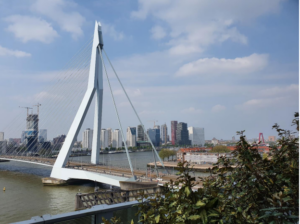
© Laetitia Augustyniak


